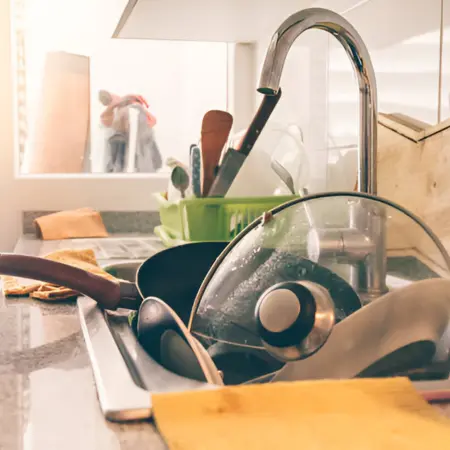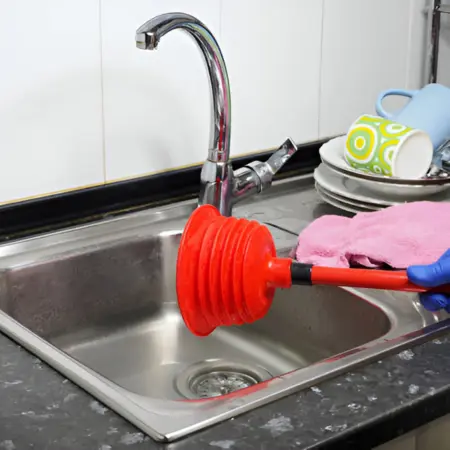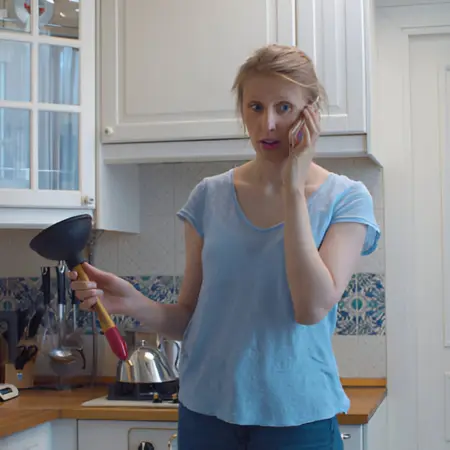Does your kitchen sink have a strange odor?
Don’t worry; it’s a common problem!
Uncover the top causes and easy fixes for those unwanted smells in this guide.
Key Takeaways
- A major reason your kitchen sink smells is food scraps and grease buildup.
- Bacteria grow in damp, dark areas, making your kitchen sink a perfect place for them.
- A blockage can stop water flow, preventing food and waste from washing away.
- If the P-trap dries out, gases can escape, causing bad smells in your kitchen.
- Cleaning regularly and using a sink strainer can help keep bad odors away.
- Baking soda and vinegar can help clear small clogs.
- Leaks under the sink and gurgling sounds mean it’s time to call a plumber.
4 Common Causes Of Kitchen Sink Smells
If your kitchen sink has a funny smell, it could be caused by a few things.
Food scraps and grease can build up in the drain, leading to bad odors.
Clogs and bacteria can also contribute to the smell.
Explore four common causes so you can get your sink smelling fresh again.

1. Food Debris And Grease Build-Up
One of the main reasons your kitchen sink might smell is food debris and grease build-up.
Tiny bits of food and grease can get stuck in the drain when you wash dishes.
Over time, these scraps break down and rot, creating unpleasant odors.
Common criminals are leftover meat, cooking oils, and scraps from fruits and vegetables.
2. Clogged Drain Pipes
Clogs can trap waste in your drain, leading to bad smells.
When something blocks water flow, it can keep food and other waste from washing away.
Symptoms of a clogged drain include:
- Slow water drainage
- Gurgling noises
- Unpleasant odors from the sink.
If you notice any of these signs, checking for a blockage is a good idea.
3. Bacterial Growth
Bacteria grow in damp and dark places, making your kitchen sink an ideal home for them.
When food debris and grease build-up, bacteria feed on them and produce bad smells.
Common spots where bacteria like to grow include:
- Sink itself
- Drain
- Around the garbage disposal.
Regular cleaning can help reduce bacterial growth and keep odors at a distance.
4. Dry P-Trap
The P-trap is a curved pipe under your sink that holds a small amount of water.
This water is a barrier, preventing sewer gases from entering the drain.
If the P-trap dries out, those gases can escape, leading to unpleasant odors in your kitchen.
A dry P-trap can happen if the sink isn’t used long.
To prevent this, run water down the sink regularly.
5 Easy Fixes For Kitchen Sink Smells
If your kitchen sink smells, there are easy fixes you can try.
Regular cleaning and using a sink strainer can help prevent bad odors.
Following these tips will help keep your kitchen sink fresh for you and your family.

1. Regular Cleaning
Keeping your sink and drain clean is one of the best ways to prevent bad smells.
Start by washing the sink with warm, soapy water.
You can use a mixture of vinegar and baking soda to clean the drain.
Pour half a cup of baking soda down the drain, followed by half a cup of vinegar.
Let it fizz for a few minutes, then rinse with hot water.
This helps break down grease and remove odors.
2. Dealing With Food Debris
Preventing food scraps from going down the drain can make a big difference.
Use a sink strainer to catch any leftover food while you wash dishes.
After each meal, scrape food from plates and pans into the trash instead of rinsing it down the sink.
This will help keep your drain clear and odor-free.
3. Unclogging The Drain
If you notice a smell coming from a clogged drain, you can try a few simple methods to clear it.
A mixture of baking soda and vinegar can help break up minor clogs.
If that doesn’t work, you might need a plunger or a plumber’s snake to clear the blockage.
A plunger can help with small clogs, while a plumber’s snake is good for more stubborn ones.
4. Rehydrating The P-Trap
If your P-trap is dry, it can cause bad odors to enter your kitchen.
To fix this, run water down the sink for a few seconds to refill the P-trap.
You can check if it’s working properly by looking for a small amount of water in the curved part of the pipe.
If the water is there, your P-trap is doing its job.
5. Preventive Measures
To keep your sink clean and odor-free, make regular cleaning a habit.
Rinse your sink daily and do a deeper clean once a week.
Try using baking soda or natural cleaners to help prevent bad smells.

When To Call A Professional
If your kitchen sink has strong odors, frequent clogs, or water backing up, it might be a bigger problem.
Leaks under the sink and gurgling noises are signs you should call a plumber.
When you hire a plumber, they will check your sink and pipes to find the problem.
They’ll explain what needs fixing and give you a cost rate.
Ask friends for recommendations or check online reviews to find a good plumber.
Ensure they are licensed and insured, and ask about rates and guarantees.
This way, you can find someone trustworthy to help with your sink issues.
Contact us at OP Plumbing Hub for expert services.
Conclusion
Understanding why your kitchen sink smells can help you find the right fixes.
This article talks about the causes of kitchen sink smell.
Furthermore, easy solutions for fixing this issue have also been discussed.
You can keep your sink fresh and your kitchen pleasant with a little effort.
